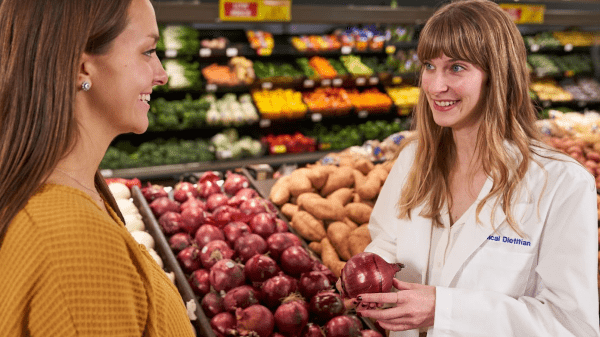This fall, America’s largest grocery retailer The Kroger Co. BB #:100073, joined the Biden administration and its White House Conference on Hunger, Nutrition and Health to give details on Kroger’s plan to expand its Food as Medicine program.
Kroger revealed some details in September, and Jim Kirby, chief commercial officer for Kroger Health, said more would come out in December and January.
He said the big picture is for Kroger to fight hunger and create healthier communities, but also, “We want customers to think of Kroger as a health and wellness destination, and not just a grocery store.”
At the White House conference, Kroger outlined the following commitments:
- Advance Food as Medicine platform nationwide: The Rockefeller Foundation, the American Heart Association, and Kroger will seek to mobilize $250 million to build a national Food as Medicine research initiative to improve the health and well-being of millions of Americans, reduce healthcare costs for insured populations and improve health equity.
- Launch a new Zero Hunger | Zero Waste Innovation Fund in partnership with Kroger Health: Building on the past success with the Zero Hunger | Zero Waste Innovation Fund, the new fund will announce an open call for startup and scalable solutions that improve health outcomes. It will invite new ideas, engage a wide range of entrepreneurs through grantee workshops and skill-building sessions, and pilot viable solutions.
- Expand access to expert, credible and convenient care through telehealth services: With the recent removal of originating site restrictions for government-funded telehealth nutrition care, Kroger will explore how opportunities for telehealth nutrition counseling will impact outcomes.
- Empower all consumers to make and have access to healthy choices by expanding OptUP nutritional scoring: Kroger will collaborate with other grocery retailers to implement OptUP system to test and determine whether it can transform into a national nutrition scoring system.
Kroger introduced its nutrition rating system, OptUP, about five years ago, and it uses a 1-100 scale where the more nutritious the food, the higher the rating.
Taylor Newman, director of nutrition at Kroger, said, OptUP is a great benefit to consumers because it empowers them to make healthier dietary choices.
Not only does Kroger share the program with fellow retailers, but Newman said it recently integrated it into the regular Kroger shopping app instead of being a separate app.
“Fresh produce will be a key component in any meal as part of a balanced diet,” she said.
Kirby said this month, Kroger plans to release details of a nutrition security benefit, which will be a card that allows consumers to purchase fresh produce and other healthful, dietitian-approved foods. He said funding will involve outside sources and should be ready to go live in January.
Newman said fresh produce will be a key food in the program, and it may even have a specific fresh produce benefit, considering how important fruits and vegetables are to dietary health.
Kirby said meetings are planned in December to work out the details of the $250 million investment in Food as Medicine, and Kroger plans to release the details early next year.
Part of that program will likely include medically tailored meal programs for patients.
“We’re hoping to guide a more personal program and help them purchase their own [healthier food] when the program ends,” Kirby said.



